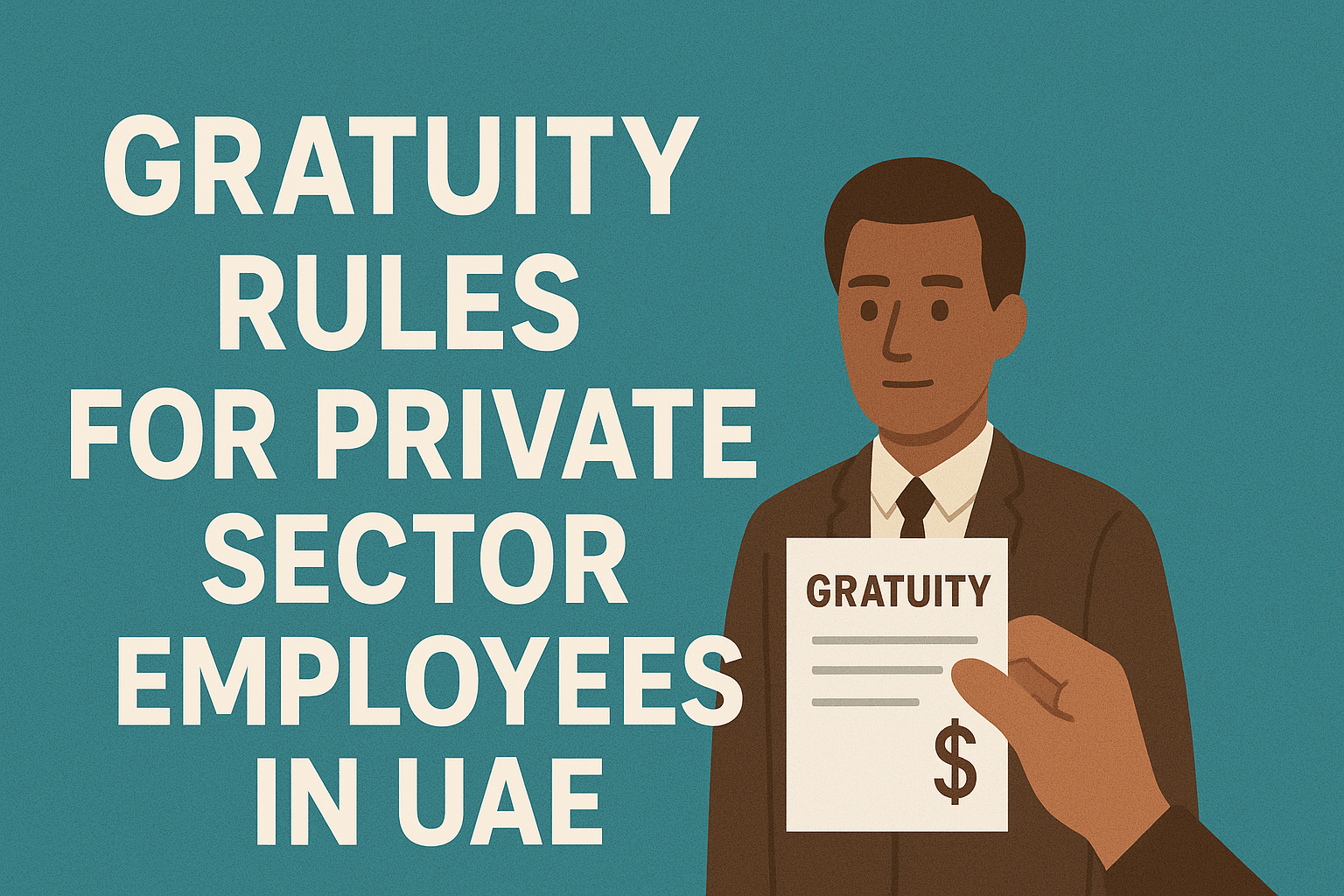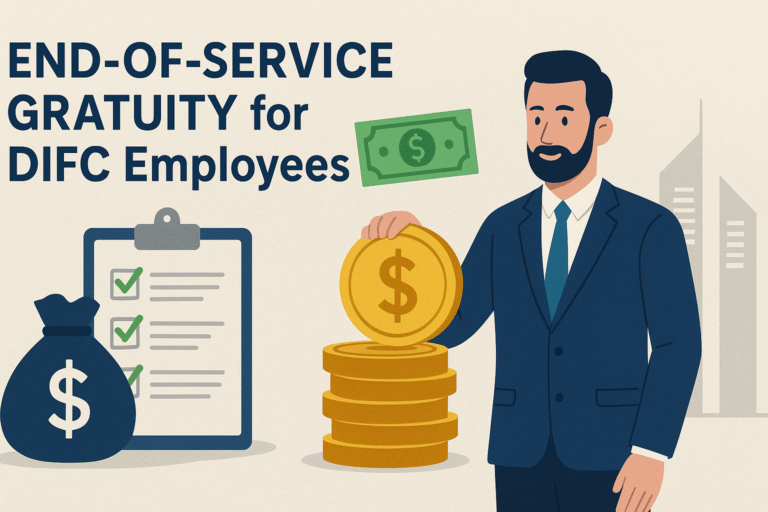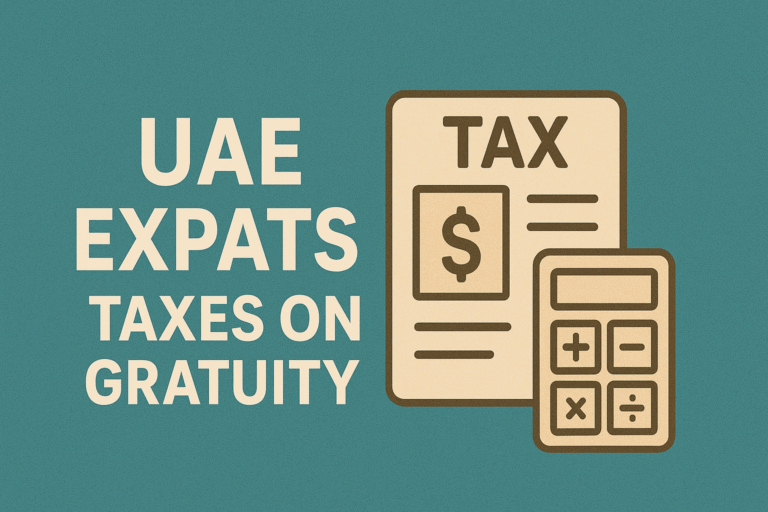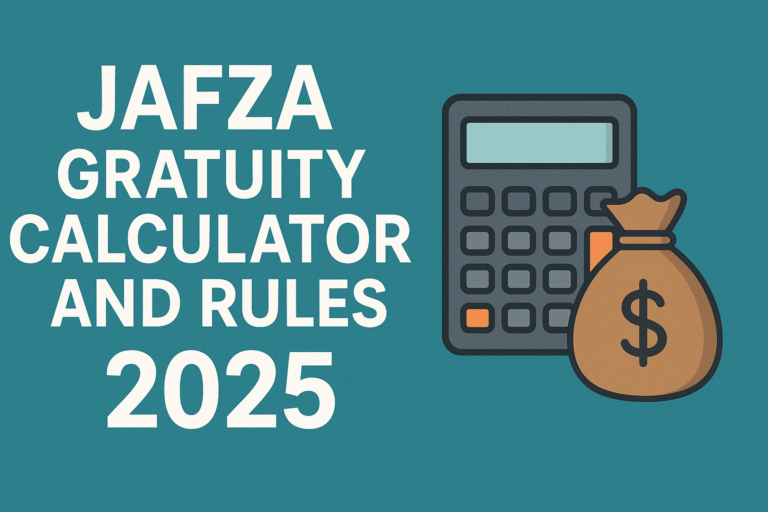Gratuity Rules for Private Sector Employees in UAE
Did you know that over 10 million expatriates working in the UAE’s private sector are entitled to gratuity payments that could amount to months of their salary? If you’re working in the UAE’s private sector, understanding your gratuity rights is important.
Gratuity, known as “end of service benefits” in the UAE, represents one of the most significant financial entitlements for private sector employees. This comprehensive guide will walk you through everything you need to know about gratuity calculations, eligibility requirements, and how to ensure you receive every dirham you’ve earned during your service in the UAE’s dynamic private sector.
Understanding Gratuity Laws for UAE Private Sector Workers
The United Arab Emirates mandates end-of-service gratuity payments for all private sector employees under Federal Decree-Law No. 33 of 2021, commonly known as the new UAE Labour Law. This statutory benefit serves as a financial safety net for workers transitioning between employment or retiring from the workforce. Crucially, this law removed previous distinctions in gratuity calculations based on contract type (limited vs. unlimited) and the reason for termination in most cases, simplifying the entitlement process.
Private sector employees become eligible for gratuity after completing one full year of continuous service. The calculation follows a tiered structure based on employment duration. Employees receive 21 days of basic wage for each year of service during the first five years, followed by 30 days of basic wage for each subsequent year.
Employers must settle gratuity payments within 14 days of employment termination. The calculation uses the employee’s final basic wage as the reference point, excluding allowances and bonuses unless specifically included in the employment contract.
Certain termination scenarios may affect gratuity entitlements. Employees dismissed for serious misconduct under the specific grounds listed in the law forfeit their gratuity rights, while those completing less than one year of service receive no payment. The maximum gratuity amount cannot exceed two years’ worth of the employee’s total wage, creating a ceiling for long-term employees.
Eligibility Criteria for Private Sector Gratuity Benefits
Private sector employees in the UAE must meet specific service requirements to qualify for end-of-service gratuity payments under current labor legislation. These criteria establish clear thresholds that determine benefit entitlement and payment calculations.
Minimum Service Requirements
The fundamental eligibility criterion requires employees to complete at least one full year of continuous service with the same employer. This 365-day period must be uninterrupted, though approved leave periods typically count toward the total service duration. Employees who resign or face termination before reaching the one-year milestone do not receive any gratuity payment.
Employment Contract Classifications
Under the new UAE Labour Law, all private sector employees must be on fixed-term contracts, for a period typically not exceeding three years (and renewable). The previous system of “unlimited” contracts has been phased out. All employees on fixed-term contracts qualify for gratuity benefits, provided they meet minimum service thresholds. Full-time employees receive standard gratuity calculations, while part-time workers earn proportional benefits based on their contracted hours. Probationary periods count toward the total service calculation once employees successfully complete their trial phase.
Exclusions and Disqualifications
Certain termination circumstances can disqualify employees from receiving gratuity payments. Workers dismissed for serious misconduct, including theft, fraud, or willful damage to company property, lose their benefit rights entirely. Additionally, employees who abandon their positions without proper notice may face gratuity forfeiture, depending on the specific circumstances and employer policies.
Gratuity Method For Private Sector Employee
UAE private sector gratuity calculations follow a standardized formula based on service duration and final salary components. The calculation method varies depending on whether employees receive basic salary structures or comprehensive wage packages.
You can calculate your gratuity for free on Gratuity Calculator UAE
Basic Salary Calculation Framework
For employees with defined basic wages, the calculation operates on a tiered system. Workers receive 21 days of basic wage for each year completed during their first five years of service. From the sixth year onward, employees earn 30 days of basic wage for each additional year worked. The final basic wage amount serves as the calculation baseline, excluding variable allowances and bonuses.
If a Basic Wage is Not Specified
The law is clear that calculations are based on the ‘basic wage’. Employees whose contracts specify all-inclusive salary packages without an itemized breakdown should refer to their contract or seek clarification from the Ministry of Human Resources and Emiratisation (MOHRE). In disputes, courts may determine a basic wage, often as a percentage of the total salary.
Practical Calculation Example
A worker with five years of service earning an AED 5,000 basic wage would receive: (21 days ÷ 30 days) × 5 years × AED 5,000 = AED 17,500
For ten years of service, the calculation becomes: [ (21 days × 5 years) + (30 days × 5 years) ] ÷ 30 days × AED 5,000 = AED 42,500
Gratuity Payment Scenarios and Termination Types
Different employment termination scenarios significantly impact gratuity entitlements under UAE labor law. The circumstances surrounding employment conclusion determine whether workers receive full, partial, or no gratuity benefits.
Resignation and Other Termination Scenarios
The new law has significantly simplified the rules. An employee who resigns or whose contract is terminated by the employer is entitled to their full gratuity payment, provided they have completed at least one year of service. The previous system, which reduced the gratuity amount for employees on unlimited contracts who resigned with less than five years of service (e.g., receiving only one-third or two-thirds of the benefit), has been completely abolished. Now, the reason for leaving (resignation or termination) does not reduce the gratuity amount, except in cases of summary dismissal for gross misconduct.
Employer-Initiated Termination
Employees terminated for serious misconduct forfeit all gratuity rights under Article 44 of the new UAE Labour Law. Qualifying misconduct includes assault, theft, fraud, disclosure of confidential information, or prolonged unauthorized absence, among other reasons explicitly stated in the law. Lesser disciplinary issues resulting in termination typically preserve gratuity entitlements, though employers may pursue separate legal remedies for workplace violations.
Misconduct and Forfeiture Cases
Employees terminated for serious misconduct forfeit all gratuity rights under Article 120 of UAE Labor Law. Qualifying misconduct includes assault, theft, fraud, disclosure of confidential information, or prolonged unauthorized absence. Lesser disciplinary issues resulting in termination typically preserve gratuity entitlements, though employers may pursue separate legal remedies for workplace violations.
Common Gratuity Disputes and How to Resolve Them
Gratuity payment disputes frequently arise between employers and employees in the UAE private sector, often centered on calculation disagreements, payment delays, and service period interpretations. Understanding common dispute patterns helps both parties navigate resolution processes effectively.
Calculation and Payment Amount Disputes
Disagreements over gratuity calculations typically involve basic wage determination and service period counting. Employers may exclude certain salary components or dispute continuous service claims, while employees challenge basic wage definitions or probationary period inclusions. Documentation becomes critical in resolving these conflicts, with employment contracts, wage certificates, and attendance records serving as primary evidence.
Payment Timeline Violations
The 14-day payment deadline following termination generates frequent disputes when employers delay settlements. Companies citing financial difficulties or administrative processing delays face legal consequences for non-compliance. Affected employees can file complaints with the Ministry of Human Resources and Emiratisation (MOHRE) to enforce timely payments.
Resolution Mechanisms and Legal Recourse
The UAE labor dispute resolution system operates through progressive stages. Initial complaints begin with MOHRE mediation services, offering free conflict resolution between parties. Unresolved cases advance to labor courts, where judges issue binding decisions on gratuity entitlements. Legal proceedings typically require three to six months, with successful claimants often recovering additional compensation for delayed payments and legal costs.
Conclusion
Understanding your gratuity rights as a private sector employee in the UAE isn’t just about knowing the law—it’s about securing your financial future and making informed career decisions. From the precise calculation methods to the various payment scenarios, every aspect of UAE’s gratuity system is designed to protect both employers and employees while ensuring fair compensation for years of dedicated service.
Remember, gratuity isn’t just a nice-to-have benefit; it’s your legal right! Whether you’re planning to stay in the UAE long-term or considering your next career move, these end-of-service benefits can provide crucial financial security. Don’t let confusion or lack of knowledge cost you thousands of dirhams that you’ve rightfully earned.
Take action today: review your employment contract, calculate your potential gratuity using the methods outlined above, and ensure you’re maximizing this valuable benefit. Your future self will thank you for understanding these critical employment rights in the UAE’s thriving private sector economy.






